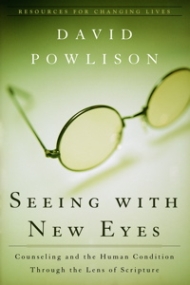David Powlison’s list of questions (plus one of my own) in Seeing With New Eyes are good for a diagnostic test on our lives now and again to help us identify idols.
- What do I worry about most?
- What, if I failed or lost it, would cause me to feel that I did not even want to live?
- What do I use to comfort myself when things go bad or get difficult?
- What do I do to cope? What are my release valves? What do I do to feel better?
- What preoccupies me? What do I daydream about?
- What makes me feel the most self-worth? Of what am I the proudest? For what do I want to be known?
- What do I lead with in conversations?
- Early on what do I want to make sure that people know about me?
- What prayer, unanswered, would make me seriously think about turning away from God?
- What do I really want and expect out of life? What would really make me happy?
- What is my hope for the future?
- What do you blog, tweet or post the most about on social networks?
Related Resources:
- Seeing with New Eyes
- Speaking Truth in Love: Counsel in Community
- Instruments in the Redeemer’s Hands
More about Seeing with New Eyes
“When our gaze awakens to the gaze of God, we have started to see. Seeing clearly, we can love well.” Seeing with New Eyes is a collection of essays by noted CCEF counselor and apologist David Powlison, editor of The Journal of Biblical Counseling. Through Bible exposition, topical essay, editorial and sermon, the book explores two main topics:
- Scripture: In his Word, God speaks into real life to help us understand him and his intentions. How do we embrace Scripture to hear him at that level?
- People: How can this deeper understanding of Scripture help us understand – and help – people (including ourselves) amid the problems of daily life?
Seeing with New Eyes shows us how to look at many common struggles through the lens of Scripture, including:
- Worry
- Victimization
- “Love languages”
- The new biomedical approach to personal struggles
Powlison encourages readers to “think Christianly” about such things by learning to think God’s thoughts after him. “Does God have a take on counseling?” he asks. “Of course, yes, amen.” This book will help you to listen, look, and think wisely – and with renewed hope – following the patterns of God’s gaze.

